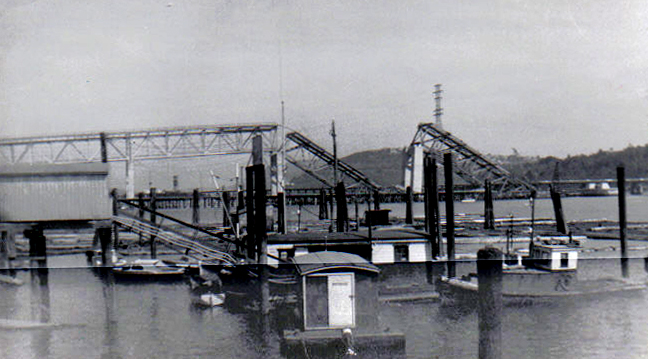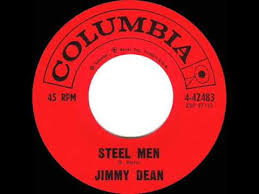When 19 “Steel Men” drowned
Editor’s note: This Classic Column is one of my favorites and is among those lost when GoDaddy lost the entire WBDaily database. Needless to say, WBD is no longer using GoDaddy to serve our columns. This column was written on August 27, 2016.

Collapsed spans, August 1958. View (looking east) of new Second Narrows Bridge, 2 months after the collapse of 2 spans. (Image used under terms cited by Wikipedia.) Ron B. Thomson / CC BY-SA (https://creativecommons.org/licenses/by-sa/3.0)
It’s amazing to think that there could be some kind of connection between a 12-year old boy growing up in Central Texas circa 1962 and the Second Narrows Bridge disaster in Vancouver, B.C. four years earlier.

“Steel Men” label on Columbia Records. 1962. (YouTube)
The 12-year old was me, of course, and I always knew about that little piece of history because of the late, great Jimmy Dean.
Dean was still years away from his days as a sausage king when he stepped into Columbia Records’ Nashville studios on May 17th, 1962 and recorded a song called “Steel Men.”
The song was not Dean’s – even though he often gets credited for writing it. Jimmy wrote the other song he recorded that day, entitled “Little Black Book.” But it was the “D. Martin” penned “Steel Men” that fascinated me.
Video: Jimmy Dean’s amazing “Steel Men”
The reason was simple.
Most country songs of the day about unrequited love or drinking whiskey. But Jimmy Dean enjoyed the occasional song about history – something he had in common with his Columbia records cohorts Johnny Horton and Johnny Cash – both of whom were also produced by Don Law. When he recorded “Steel Men,” Jimmy had just had a major hit with “P.T. 109” – a World War II ballad about John F. Kennedy.
JFK was sitting in the Oval Office at the time, and I knew about his war heroics on the day the “109” was sunk. But there was no internet and no Wikipedia, and so all my curious mind knew about the Second Narrows disaster was contained in the lyrics of the song.
Guess what? The story told in the song is essentially true. But it took four decades and the Information Superhighway for me to discover what really happened.
Video: Roger Whittaker’s version of “Steel Men” from his 1963 album “Butterfly”
The disaster at Second Narrows.
A narrows is a restricted land or water passages. Most commonly a narrows is a strait, though it can also be a water gap.
In 1958, steel men were building a bridge at Second Narrows to facilitate easy crossing over to another part of Vancouver when a big wind came up. From Wikipedia:
On June 17, 1958, as a crane stretched from the north side of the new bridge to join the two chords of the unfinished arch, several spans collapsed. Seventy-nine workers plunged 100 feet into the water. Eighteen were killed either instantly or shortly thereafter, possibly drowned by their heavy tool belts. A diver searching for bodies drowned later, bringing the total fatalities for the collapse to 19. In a subsequent Royal Commission inquiry, the bridge collapse was attributed to miscalculation by bridge engineers. A temporary arm, holding the fifth anchor span, was deemed too light to bear the weight.
19 Scarlet Roses came to symbolize the men who drowned.
The disaster at Second Narrows – now known as the Ironworkers Memorial Second Narrows Crossing in honor of those who died – is not as well known as the sinking of the Titanic or the destruction of the Hindenburg. But it is legendary in Canada where the memory of the steel men has never died.
Video: 19 Scarlet Roses
Jimmy Dean & “Steel Men”
I interviewed Jimmy Dean on radio a few years ago, but his memory about specific songs had faded. We may never really know where he heard the song, or whether Don Law brought it to him. All we know is that Dean did a rousing interpretation of the song that featured Grady Martin on guitar, Floyd Cramer on piano and a zestful harmonica lead by Jimmy Riddle.
In 1962, I bought the single and wore it out on my portable turntable as the striking lyrics became emblazoned in my mind:
“If somebody wanted to the bridge the Pacific, a Steel Man would be there!”
“Steel Men, ain’t going back to wife and daughter.”
Dean’s version of the song is upbeat, lifting up the men who died as brave heroes. It’s far more rousing than another version recorded by Roger Whittaker – though both have their appeal.
Stompin’ Tom Connors & “The Bridge Came Tumbling Down”
If you don’t know Stompin’ Tom – look him up. It’s too late to see him in concert, but he is one of Canada’s greatest musical talents and his legacy is that he put a great deal of his country’s history in song.
Video: Stompin’ Tom Connors – The Bridge Came Tumbling Down
Stompin’ Tom’s 1972 song “The Bridge Came Tumbling Down” is every bit as gripping as Dean’s recording. Connors starts his narrative with the legend of the 19 Scarlet Roses and then tells about the big wind that brought the bridge down. The song never loses sight of the 19 men and makes them the centerpiece of the story. The lyrics grab you from the opening bars:
“19 Scarlet Roses, the Chaplain spread around.”
“And 19 men were drowned so you could ride to the other side of old Vancouver town.”
Stompin’ Tom has a style reminiscent of Johnny Cash. And he sang every song he ever did with his left boot literally stomping out the time.
Video: Les Claypool’s version of “The Bridge Came Tumbling Down”
It’s difficult to decide which song is more compelling. Both tell a story that was not so far removed in history at the time they were recorded. Both produced lyrics that are unforgettable with the power to take to you to Vancouver in June of 1958 – the day the bridge came tumbling down. And 19 steel men died. And the chaplain spread 19 Scarlet Roses so that people would never forget.
The power of history set to music.
We don’t get music like this very much anymore. But when I was kid, these true stories in song were actually on the hit parade. Jimmy Driftwood’s seminal song “The Battle of New Orleans” was covered by Johnny Horton and went to Number One. Dean’s “P.T. 109,” and Cash’s “The Ballad of Ira Hayes” were hits. Peter, Paul & Mary recorded “The Ballad of Springhill” about the Canadian mining disaster. Gordon Lightfoot sang about “The Wreck of the Edmund Fitzgerald.”
Today’s country music doesn’t really go there.
Neither does pop or hip-hop where we get fed commercialized pabulum about booze, sex and drugs.
In my own writing, I’ve tried a couple of historical pieces. As “TwoFolk,” Robert Malsbary and I recorded “They said It Was Only One Man” in 1975 – a story about the JFK assassination. More recently, I completed a song called “The Battle of San Jacinto” that I often perform during gigs. Unfortunately, it’s never been recorded – and we no longer have Jimmy Dean or Stompin’ Tom to sing it. Today, nobody much cares about music that really is about something.
Video: My 1975 song “They Said It Was Only One Man”
The memory of the Second Narrows disaster will live forever – because of music.
As a pre-teen, I often wondered what Jimmy Dean’s song was all about and was it real? Now that I know the truth, I love and appreciate the song even more. I love the fact that Deans’ song led me to Stompin’ Tom and his awesome and powerful ballad about the same event.
Because of music, I know about Second Narrows. I never knew any of the men who died, but I can join my Canadian bothers and sisters in honoring their memories. Until the day I die, the melodies of these two great songs will be part of me and the words will continue to inspire.
So if 19 Scarlet Roses should ever pass before your mind, wander back to that fateful day in June of 1958 when a big wind came and the bridge came tumbling down. And men who expected to go home to wife and daughter never did. Nineteen men were drowned so you could ride to the other side of old Vancouver town.
Lynn Woolley is a Texas-based author, broadcaster, and songwriter. Follow his podcast at www.Planet Logic.us. Check out his author’s page at https://www.Amazon.com/author/lynnwoolley Order books direct from Lynn at https://PlanetLogicPress.Square.Site Email Lynn at lwoolley9189@gmail.com.

